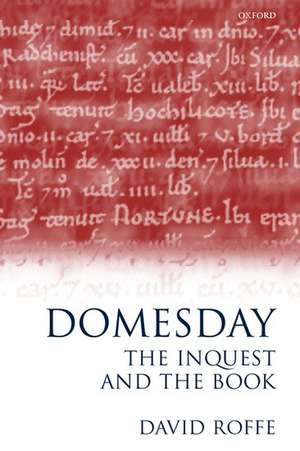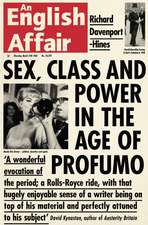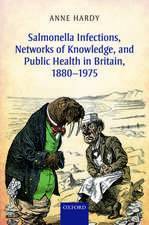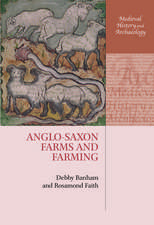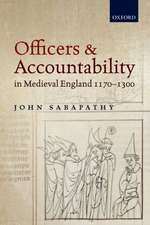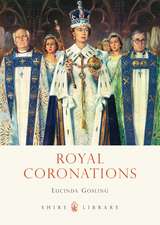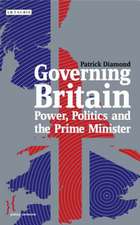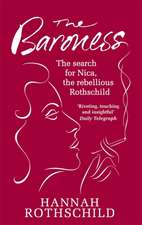Domesday: The Inquest and the Book
Autor David Roffeen Limba Engleză Hardback – 23 mar 2000
Preț: 687.27 lei
Preț vechi: 1040.59 lei
-34% Nou
Puncte Express: 1031
Preț estimativ în valută:
131.57€ • 136.76$ • 109.09£
131.57€ • 136.76$ • 109.09£
Carte tipărită la comandă
Livrare economică 27 ianuarie-03 februarie 25
Preluare comenzi: 021 569.72.76
Specificații
ISBN-13: 9780198208471
ISBN-10: 0198208472
Pagini: 302
Dimensiuni: 162 x 242 x 22 mm
Greutate: 0.59 kg
Editura: OUP OXFORD
Colecția OUP Oxford
Locul publicării:Oxford, United Kingdom
ISBN-10: 0198208472
Pagini: 302
Dimensiuni: 162 x 242 x 22 mm
Greutate: 0.59 kg
Editura: OUP OXFORD
Colecția OUP Oxford
Locul publicării:Oxford, United Kingdom
Recenzii
there is intriguing material here even for the uninitiated.
With meticulous care Roffe unscrambles the chronology of completion
Roffe's study helps to reconstruct a tentative chronology of the writing.
This is an imaginative and courageous book, and a valuable contribution to Domesday scholarship.
The book is the product of very considerable learning. Not the least of its virtues is its extensive bibliography.
This is by any standards a remarkable thesis. To read it is to feel as if the landscape of Domesday scholarship has been struck by a tidal wave: one feels compelled to return to that landscape to see how many of the familiar structures of Domesday historiography have been swept away, and whether some of them will remain standing when the water eventually recedes.
develops a radically new interpretation of Domesday Book
This book challenges most of the current orthodoxies of Domesday scholarship ... Controversial though it is, no one with a serious interest in Domesday Book and the society it documents should ignore this book ... Dr Roffe has written a stimulating work which will cause scholars to revise much of what they currently believe, and to question much else.
By marking the ways that the scribe modified his systems of notation and organization, Roffe's study helps to reconstruct a tentative chronology of the writing. ... With meticulous care Roffe unscrambles the chronology of completion and succeeds at least in identifying the early quires.
Roffe has not written a book for the curious nonspecialist who wants a learned introduction to Domesday studies. This is a technical work that assumes considerable familiarity with the concepts and language of land tenure in medieval England. Still, there is intriguing material here even for the uninitiated.
In this closely argued study Mr Roffe slowly and painstakingly disentangles all the strands that made up both the inquest and the 'king's book' which came later. Much new evidence is thrown up and also new insights.
David Roffe offers us a fresh look at some obstinate problems about a justly famous medieval manuscript.
His book has much more in it than his main thesis that Domesday Book was an afterthought... Roffe exhorts us to abandon myth and anachronistic historical baggage... David Roffe offers us a fresh look at some obstinate problems about a justly famous medieval manuscript.
With meticulous care Roffe unscrambles the chronology of completion
Roffe's study helps to reconstruct a tentative chronology of the writing.
This is an imaginative and courageous book, and a valuable contribution to Domesday scholarship.
The book is the product of very considerable learning. Not the least of its virtues is its extensive bibliography.
This is by any standards a remarkable thesis. To read it is to feel as if the landscape of Domesday scholarship has been struck by a tidal wave: one feels compelled to return to that landscape to see how many of the familiar structures of Domesday historiography have been swept away, and whether some of them will remain standing when the water eventually recedes.
develops a radically new interpretation of Domesday Book
This book challenges most of the current orthodoxies of Domesday scholarship ... Controversial though it is, no one with a serious interest in Domesday Book and the society it documents should ignore this book ... Dr Roffe has written a stimulating work which will cause scholars to revise much of what they currently believe, and to question much else.
By marking the ways that the scribe modified his systems of notation and organization, Roffe's study helps to reconstruct a tentative chronology of the writing. ... With meticulous care Roffe unscrambles the chronology of completion and succeeds at least in identifying the early quires.
Roffe has not written a book for the curious nonspecialist who wants a learned introduction to Domesday studies. This is a technical work that assumes considerable familiarity with the concepts and language of land tenure in medieval England. Still, there is intriguing material here even for the uninitiated.
In this closely argued study Mr Roffe slowly and painstakingly disentangles all the strands that made up both the inquest and the 'king's book' which came later. Much new evidence is thrown up and also new insights.
David Roffe offers us a fresh look at some obstinate problems about a justly famous medieval manuscript.
His book has much more in it than his main thesis that Domesday Book was an afterthought... Roffe exhorts us to abandon myth and anachronistic historical baggage... David Roffe offers us a fresh look at some obstinate problems about a justly famous medieval manuscript.
